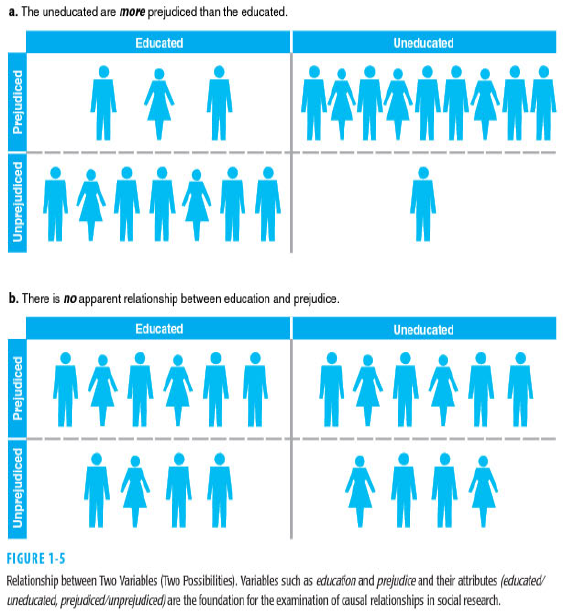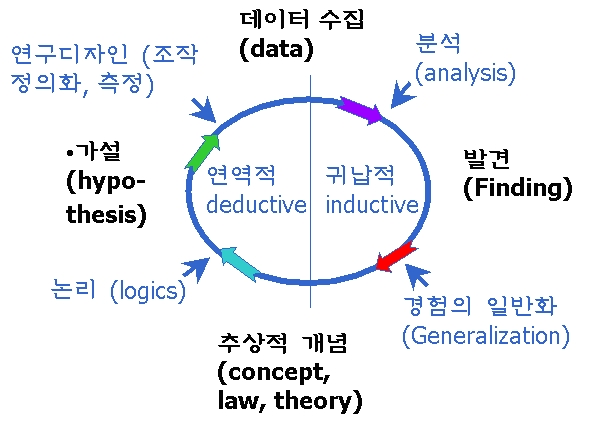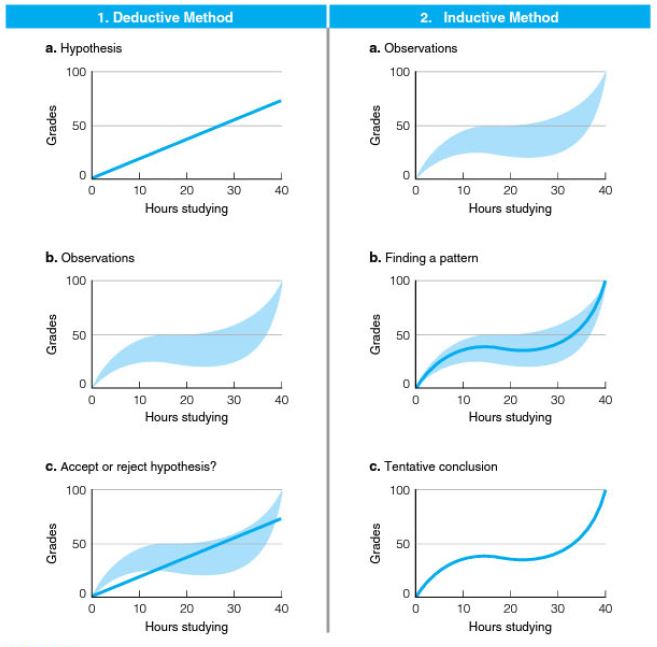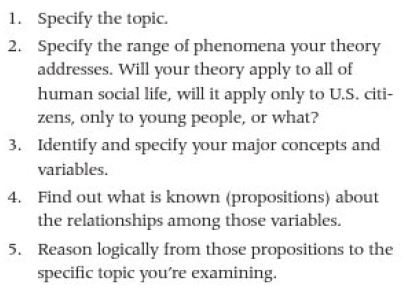This is an old revision of the document!
Table of Contents
Research Methods Schedule Outline
week 1, 2, 3, 4. Grouping. Exploring the research interests.
week 5, 6, 7. In-depth research review. Developing research questions/hypotheses. Designing methods.
week 8. Quiz
week 9, 10, Designing methods.
week 11, 12. Data gathering.
week 13. 14. Analyzing and discussing the results
week 15. Presentation
week 16. Quiz
Textbook.
This site http://commres.net/wiki
https://www.socialresearchmethods.net/kb/index.php
Week 1: Introduction and Theories and Methods (Mar 4, 7)
Concepts and Ideas
Introduction
Science and social science
Paradigms, Theory and social research
Read Theories and Research Methods Lecture Note
- Natural science and social science
- science - social science
- principle, theory (만유인력법칙, 상대성이론)
- finding regularity
- Science way of knowing – scientific knowledge
- Knowing, knowledge = a product of social construction?
- Reality = social construction?
- science = logical and empirical
- Theory - philosophical way of explanation
- plato's idea
- empiricism
- John Locke
- David Hume
- observation and logic
- Ethics
- No harm to participants
- informed consent form
- Anonymity and confidentiality
- Deception and debriefing
- IRB (institutional review boards)
- Laud Humphreys' study Tearoom Trade (p.64 찻집사건)
-
- Without the subjects’ knowledge, Humphreys recorded their license plate numbers and tracked them down a year later. After changing his hair, attire, dress, and car, Humphreys visited the homes of the subjects. Under the guise of a social health surveyor, Humphreys interviewed the subjects about their lives without disclosing that he had already met them before.1 Humphreys conducted these in-person interviews to discover what aspects of the subjects’ home lives motivated them to engage in this illegal and taboo activity. http://www.soc.ucsb.edu/sexinfo/article/tearoom-trade
-
- Milgram's study (Human obedience)
Assignment 1
Week 2: Research Methods and Theories, cont. (Mar 11, 14)
Concepts and Ideas
- from the previous week +
- Human inquiry and science
- In general, a scientific assertion must have logical and empirical support: It must make sense, and it must not contradict actual observation. . . . Epistemology is the science of knowing; methodology (a subfield fo epistemology) mught be called the science of finding out. This book presents and examines social scientists find out about human social life.
- Social science, foundation
- Theory
- Regularities and social regularities
- natural science regularities . . . principles (법칙) or theories (이론) 으로 나타남 (mostly using mathematics language)
- social science . . . principles rare
- social regularities always yield exception
- hence, theory driven social regularities
- hence, probabilistic regularity
- Social science theory (theories)
- 과학에서 사회과학으로 (p. 87- )
- 초기 실증주의 (A Comte, 1789-1857)
- 사회학 단어의 coin (in fact, he called social physics at first)
- 종교로부터의 분리
- 논리와 경험감각(오감)을 통한 과학적 방법을 통해서 진리에 접근 (사회에 대한)
- positivism
- 사회진화론
- Charles Darwin, The Origin of Species (종의 기원)
- 적자생존의 법칙
- 사회에도 적용, Herbert Spencer (1820-1903)
- 진보와 향상을 전제로 한 사회진화론
- 갈등 파라다임
- Karl Marx
- Marxism . . . 이조차도 과학에 근거를 둔 주장
- Theory from the below principles
- conflict paradigm
- dialectical progress and development (변증법적 전개와 발전)
- historical materialism: means of production
- primitive accumulation of capital
- alienation of labor
- 사회연구에 대한 과학적 접근 theory parts in lecture note
- conjunctive
- 위의 것들
- + 구조기능주의
- attributes-based
- situated
agent-enacted
- Attributes-based
- 이 중에서 처음 2 종류의 이론적 견지를 사회과학이라고 하는 경향 (했던 경향)
- conjunctive vs attributes (거시 vs 미시 in textbook, p. 87)
- Then, situated. what is it?
- regularity . . . losing efficiency in explaining societies
- exceptions exceptions
-
- 책상이라는 존재의 무존재
- 현상학
- 민간방법론(ethnomethodology)
-
- Study of ideas and concepts and constructs
- Study of variables
- Relationships among variables
- Nomothetic explanation . . . regularities
- Determinism vs. Free Will
- Induction (연역) vs. deduction (귀납)
- Qualitative vs. quantitative
- Scientific vs. . . . . (phenomenonological?)
- Ethics
- No harm to subjects
- Confidentiality vs. Anonymity
- Deception
- Report (to …)
- System … IRB
Class activities
Key terms
- attribtues
- deduction
- induction
- nomothetic
- dependent variable
- idiographic
- theory
- independent variable
- variables
Assignment 2
- Take a short survey
- Read the article, 제3자 효과이론과 침묵의 나선이론 연계성 and summarize in your own ideas and terms. Submit as an assignment by the next Thursday class (과제 제출 페이지), “제3자 효과이론과 침묵의 나선이론 연계성 논문 정리” 항목
- What are the research questions?
- What are the hypotheses and what are the author's expectations?
- What are the related theories? Explain them.
- What are the findings?
Week 3: Research Methods and Theories, cont. (Mar 18, 21)
Notes
- 조원 확정 ← next week
Concepts and Ideas
- about homework 이론 . . . .
- more business oriented? decoy effects
연구제안서 (Research Proposal)- 파라다임: 관찰이나 추론을 구성하기 위해서 사용하는 근본적인 모델이나 준거틀
- Thomas Khun (1970): 파라다임
- 중요하고 실질적인 변화에 저항하는 자기방어적인 틀 형성으로
- 이상성(anomaly)이 축적되는 형태로, 그리고 종국에는 옛것을 새것이 대체하는 형태로 …
- 과학혁명의 구조(The Structure of Scientific Revolution)
- 실증주의 (positivism), A. Comte
- 과학적 접근법을 이용한 사회연구
- 사회진화론
- 종의기원 (C. Darwin)
- Herbert Spencer (1820-1903)
- 갈등 파라다임
- K. Marx (1818-1883)
- Historical Materialism
- G. Simmel 등 소규모 갈등관계
- M. Chossudovsky, 1997 연구: IMF가 선진국 다국적 기업의 이익을 위해서 개발도상국이 이용되는 것을 보여줌
- 상징적 상호작용 (symbolic interactionism)
- G. Herbert Mead
- Socialization through social interaction
- Generalized others
- 민간방법론
- Ethno-methodo-logy
- H. Garfinkel
- 구조기능주의
- 유기체(organism): 항상성 유지, 발전(성장)
Assignment
Class Activities
Week 4: Research Questions and Hypotheses (Mar 25, 27)
Textbook
- 사회이론의 요소
- 사실을 모으는 관찰 observation for facts
- laws and principles
- 보편적 확실성 in natural science
- but, in social science
- 이론: 특정한 생활양식과 연관된 관찰에 대한 체졔적인 설명
- 개념
- 변수(변인)
- 공리, 가정, 명제, 가설
- 과학 논리체계
- Theories 이론기반 - 분배정의 (distributive justice)
- 가계소득 수준과 청소년 비행 간의 관계
- 연구문제: 가계소득 수준과 청소년 비행 간의 관계
- 개념: 가계소득 수준 (socio-economic status) | 청소년 비행
- 가설: 위의 개념 간의 관계를 이론에 맞추어 선언. 이 때의 개념은 측정가능한 것으로 만들어져야 하는데 이를 조작화라고 함
- Observation 관찰
- 연역, 귀납
- 연역 (deduction1))
- 귀납 (induction)
- 마리화나 예
- 흡연자와 비흡연자: 동등한 학업성적, 학교활동, 대학생활적응
- But,
- 여성 < 남성
- 동양계 < 비동양계
- 집 < 자취
Concepts and Ideas
- 가설
- 연역
- 귀납
- 이론
- 조작화
- 조작적 정의
- 도서관 사용
- endnote 혹은 refworks – see reference management
Assignment 4
Group discussion
- What are your research interests in general terms?
- Pick at least 3 related terms, and use them as search term to find research articles.
- if the result contains too many articles, specifying your terms so that fewer result would come out. Please write (describe) how you ended up with such specified terms in the assignment.
- If you are satisfied with the result, describe what they are.
- Find at least 2 research articles for each (specified) term, and describe what they studied.
Submit to Ajoubb.
Week 5: Research Questions and Hypothesis II (April 1, 3)
Concepts and Ideas
- 연구 프로젝트
- 개념화
- 조사방법선택
- 조작화
- 모집단과 표집
- 관찰
- 자료처리
- 분석
- 적용
- 연구계획서
- 문제 혹은 목적
- 문헌검토
- 연구대상
- 연구문제 혹은
- 가설
- 측정
- 자료수집방법
- 분석
- 예상결과
- 시간계획
Class Activities
Assignment
그룹과제: (다음주 화요일 자정까지)
- 그룹 구성원들과 협업하여 연구주제와 연구문제를 정리하시오
- 넓은 의미에서의 주제에서 시작하여 관련된 키워드를 이용하여 참고문헌(reference)을 찾아 보고
- 이를 토대로 구체적인 연구주제와 연구문제로 발전시키시오 (specify).
- 연구주제나 연구문제는 사회과학적인 것이어야 합니다.
- 앱 개발/서비스 개발과 같은 종류는 안됩니다.
- 무엇에 대해서 알아보는 것은 지양하시기 바랍니다. 가령 fake news를 구분해 내는 방법을 알아보고 이를 정리하자는 것은 좋은 연구문제가 될 수 없습니다. 반면 fake news라는 것이 왜 생기고 어떻게 유통되는지에 대해서 알아보고 설명하면서 fake news와 관련된 연구문제를 만드는 것은 좋은 방법입니다. 왜냐하면 이렇게 접근하면서 구체적인 연구문제를 생각해볼 수 있기 (도출해 낼 수 있기) 때문입니다.
Week 6: Research (April 8, 10)
April 12 개교기념일
Concepts and Ideas
- Sampling 표집
- 역사:
- Alfred M. Landon | Literary Digest | Presidential candidate | 1916년 여론조사 (Woodrow Wilson vs. Charles Hughes) 예측 | 이후 매 4년마다 정확한 예측 | 1936년 예측: 전화번호부 + 자동차소유주 명부 → 1천만명 중 2백만명 응답 (22% 회수율 혹은 응답률) | Landon 57 vs Roosebelt 43 | Roosebelt 61 |
- Sampling frame see Sampling
- Thomas Dewey
- Thomas Dewey
- George Gallup | quota sampling (할당) | American Institute of Public Opinion | 36, 40, 44년 예측 | 1948. Thomas Dewey vs. Harry Truman |
- 상승추세 중 조사중단 | sampling representativeness
Activities
- Using Refworks with MS Word reference management
- Discussion: Library Search
- Group Discussion: Building RQs and Hypotheses
Assignment
Group Assignment
- 지난 과제에 이어서 자기 조의 연구주제 범위를 조정하여 정리하세요.
- 참고문헌을 찾아보고 이를 토대로 어떤 연구를 할 것인지 정리하여 9주차 두 번째 시간에 발표할 수 있도록 준비하세요.
- 연구주제는 사회과학적인 것이어야 합니다.
- 앱개발, 게임개발, 서비스개발 등은 지양합니다.
- 앱을 개발해서 그 사용성, 유용성, 등을 알아보는 것은 가능할 수 있습니다.
- 게임의 중독성에 어떤 것들이 있고, 이에 따라서 게임이 어떻게 나눠질 수 있는지 등을 실험하는 것은 가능할 수 있습니다. 단순한 기술(description)은 안됩니다.
- fake news를 구분하는 방법을 알아보고 이를 정리하는 것은 기술형이라서 지양해야 하지만, fake news가 가진 특성을 가지고 fake news를 구분하거나 가려내는 방법의 효용성 등을 알아보는 것은 가능할 수 있습니다.
- 자신이 관심을 가진 분야에 대한 데이터를 수집하여 효과적인 것을 도출해 내는 것 + 데이터를 시각화하는 것 가능
- 크롤링을 통한 데이터수집 및 분석은 가능합니다. 단 수집에 앞서 무엇을 수집하고 분석할 것인가에 대한 정리가 잘 되어야 합니다.
- 영화가 성공하기 위한 조건을 알아보는 것 또한 가능합니다.
- 그룹의 연구주제를 강사와 의논하여 확정하고 이를 토대로 연구방법을 디자인 하도록 합니다.
- Group discussion and questions should be listed in journal page (create one).
Announcement
Quiz:
- 1st quiz: 4/15 (classroom)
- Textbook + Lecture + materials used in the classroom (Theories, Lecture Note, etc.).
-
- Science, natural science, social science, humanity part
- Inquiry for researching
- 커뮤니케이션 이론과 방법론
- 이론
- 철학적인 접근에서의 이론
- 과학적 방법론
- 연역과 귀납
- 접합중심적 접근 (Conjunctive-based approach)
- 특성중심적 접근 (Attributes-based approach)
- 상황중심적 접근 (Situation-based approach)
- 이론과 방법론
- 연구문제의 제기와 가설 부분까지
- Schedule 페이지 중의 외부문서 링크(위키피디아 등)의 내용은 일일이 숙지할 필요는 없으나 무엇과 관련된 것인지는 알아야 하며, 이와 관련된 강의내용은 숙지해야 합니다.
- In the Theories 문서
- In relation to the lecture note
- conjunctive, attributes, situation-based approach and examples (theories) such as agenda setting, cognitive dissonance, spiral of silence, etc.
Week 7 (April 15, 17)
Concepts and Ideas
research design
- survey
- experiment
Week 8: Midterm Period (April 22, 24)
Concepts and Ideas
Assignment
Week 9: (April 29, May 1)
Concepts and Ideas
- group presentation on research interests
In survey methods
- Levevl of Measurement
-
- 상호배타적 (mutually exclusive)
- 망라적 (exhaustiveness)
-
- Bielby, W., & Bielby, D. (1999). Organizational Mediation of Project-Based Labor Markets: Talent Agencies and the Careers of Screenwriters. American Sociological Review, 64(1), 64-85. Retrieved from http://www.jstor.org/stable/2657278 PDF
- 측정: 대학에서의 학업성취
Assignment
Week 10: (May 6, 8)
Assignment
Group Assignment 10 (다음 주 수요일 수업시간 전까지 완성)
- 도서관에서 자기 조의 관심분야와 관련된 연구논문을 찾아보세요. 논문은
연구가설이 포함된 논문이어야 합니다.- 데이터를 이용한 실증적인 분석을 한 논문이어야 합니다.
- 대학원 석박사 졸업논문은 과제에 포함되지 않습니다 (석박사 논문을 찾아 읽고 그 안에 다른 논문이 궁금하여 찾아서 다시 읽는다면 문제 없습니다).
- 자기 조의 연구문제에 대해서 설명하시오. 연구문제는 구체적이어야 합니다. 이 부분은 그룹단위로 완성하시면 됩니다.
- 가령 “스마트폰의 영향력”과 같은 주제는 너무 광범위합니다.
- “2010년대와 1990년대의 가요가사분석” 등은 구체적입니다
- 혹은 “시대별 (decades) 가요가사 분석비교” 등도 구체적입니다.
- 미국 빌보드차트의 가요를 위와 같이 비교하는 것도 가능합니다.
- “헐리우드 영화와 한국영화 간의 콘텐츠 특성 비교” 등도 구체적이라 하겠습니다.
- 위와 같은 specific한 주제를 가지고 관련 논문을 찾아 아래를 수행하시기 바랍니다.
- 각 연구에서 (이 부분은 그룹 구성원 별로 두 개의 논문을 맡아서 하셔야 합니다)
- 연구주제와 문제가 무엇이었는지,
- 연구가설이 있다면 무엇이었는지,
- 종속변인과 독립변인은 무엇이었는지,
- 각각의 측정은 어떻게 이루어졌는지,
- 어떻게 데이터를 수집했는지, 혹은 측정했는지
- 데이터분석은 어떤 방법을 이용하였는지
- 연구결과를 설명하시오.
- 연구결과가 자기조의 관심사와 어떻게 연관이 있는지를 설명하시오.
Week 11: (May 13, 15)
Concepts and Ideas
research design
양적관찰 vs 질적관찰
- Unobtrusive Research 비개입적 연구
- Qualitative 질적현장연구
- Case Study
- Institutional Ethnomethodology
- Participatory Action Theory
Assignment
- Finding quantitative research article
- Write article information in APA style (with REFWORKS)
- List “titles(heads)” and “subtitles(subheads)”
- Find “measuring variables (변인의 측정)” or similar head
- Explain how the authors measured the concepts involved in the article
- Explain how and
- state the level of measurement (NOIR)
- What kinds of method did the authors take for the measurement? (survey? experiment? or what?)
- What kinds of data do you think you require for the project (그룹프로젝트)?
- explain how you are going to measure.
Week 12: (May 20, 22)
Concepts and Ideas
Assignment
Week 13: Some Others (Clustering, Social Network Analysis…) (May 27, 29)
Quiz at the second class of the week 14.
Concepts and Ideas
Assignment
Announcement
Quiz 03:
강의 내용
- from week 2 (social science and theories)
- 4가지 이론적 접근방법들
- 소개된 이론들
- decoy effect
- the third person effect
- the elaboration likelihood model
- cognitive disorder
- agenda setting
- etc.
- sampling
- introduction to the social networks analysis
- Research Question
- Hypothesis
- Conceptualization
- Level of measurement:
- NOIR
- Lickert
- Semantic Differential
- 쌍대비교척도
- Reliability
- Validity
Research DesignSurveyExperiment
- Research ethics
- 강의내용
Week 14: Some Others (Clustering, Social Network Analysis…) (June 3, 5)
Concepts and Ideas
Assignment
Assignment final (group)
- Layout the outline of your research works - as found in research articles you have read. The outline should be similar to the below.
- Introduction
- define the research problem
- introduce the related theories and ideas
- sum up what you are going to study
- Reviewing previous (related) studies
- review articles and research works that are related to your research works.
- related the works to your research
- what are the shortfalls of the studies;
- how they have (not) been dealt with by others;
- why my(our) research works are important in relation to this line of works
- Propose research questions or build hypotheses
- propose research questions based on the review section or build hypotheses
- articulate the research questions and hypotheses
- based on the previous reviews and the relative theories
- Research design
- data gathering and methods of analyses
- how you are going to gather the data;
- survey
- survey questionnaires
- experiment
- describe the experiment method
- other data gathering methods
- describe how you are going to get the data
- measuring the concepts and ideas (if necessary)
- Analyses
- discuss how you are going to analyze the data
- discuss anticipating results and
- articulate how they are important in terms of this line of reserach works
- References
- list references in APA style format
- you should also cite articles (in the assignment body) in APA style (please refer to the https://library.khu.ac.kr/seoul/referencingNcitation/apa page)
please refer to the below articles
- 권혁남. (2018). 이슈 특성과 지각된 의견분위기 상황에 따른 침묵의 나선효과. 사회과학연구, 29(4), 61-82. PDF
Week 15: Project Presentation (June 10, 12)
final assignment
previous assignment + research design
목요일까지 제출 금요일까지 오후 3시까지 제출
- 자기 조의 연구주제 확정하고,
- 주제와 관련된 선행연구 조사, 정리하기
- 이와 관련지어 연구문제 혹은 가설을 확정하기
- 연구문제 혹은 가설은 선행연구조사에 기반하여 도출해야 함
- 선행연구조사 = maybe 관련 이론 (사회학, 사회심리학, 커뮤니케이션학) 포함
- 서베이, 실험, 이차데이터분석, content analysis 등의 방법을 이용하여 관련 연구 방법을 정리하기
- 서베이: 연구문제, 가설과 관련된 변인(변수) 설명 및 측정 방법 설명 (서베이 Questionnaire 포함)
- 실험: 연구문제, 가설과 관련된 실험 디자인 및 변수(인) 측정 방법 설명
- content analysis: 연구문제, 가설과 관련된 콘텐츠 수집방법 및 변수(인) 측정방법 설명
- 예상되는 분석결과에 대한 discussion
Week 16: Final Period (June 17, 19)
범위
types of error
7장
2. 지수 대 척도: 지수와 척도 차이점
4. 척도의 구성:
8장. 서베이 조사
2. 적합한 주제
3. 질문을 위한 지침
- 모두
4. 설문지 구성
- 일반설문지 형태
- 조건부 질문
- 행렬식 질문
- 문항의 순서
- 지시문
5. 자기기입식: 응답률 부분만 (p.370)
8. 온라인서베이
9. 서베이방법들 간의 비교
10. 장단점
11. 이차분석
9장
2. 적절한 주제
3. 고전적 실험
- 독립, 종속변수
- 사전, 사후조사
- 실험, 통제집단
4. 피험자 선정
- 확률표집
- 무작위화
5. 다양한 실험설계
- 실험설계
- 타당도 문제
- 실험예시
7. 대안적 심험상황
8. 장점과 단점
10장 내용분석
2. 내용분석
- 적절한 주제
- 표집
- 분석단위
- 표집기법
- 내용분석의 코딩
- 현재/잠재
- 내용분석의 실제 사례
3. 기존 통계자료의 분석
- 뒤르켐의 연구
- 세계화
- 분석단위
- 타당도의 문제
- 신뢰도의 문제
4. 비교역사분석
- 예
- 분석방법
11장. 현장연구 (Field Study)
2. 적절한 주제
3. 고려사항
- 관찰자의 역할
- 관찰 대상과의 관계
4. 파라다임들
- 자연주의
- 민간방법론
- 현장기반이론
- 사례연구
5. 실행
- 준비
- 질적면접
- 포커스그룹
- 관찰기록





